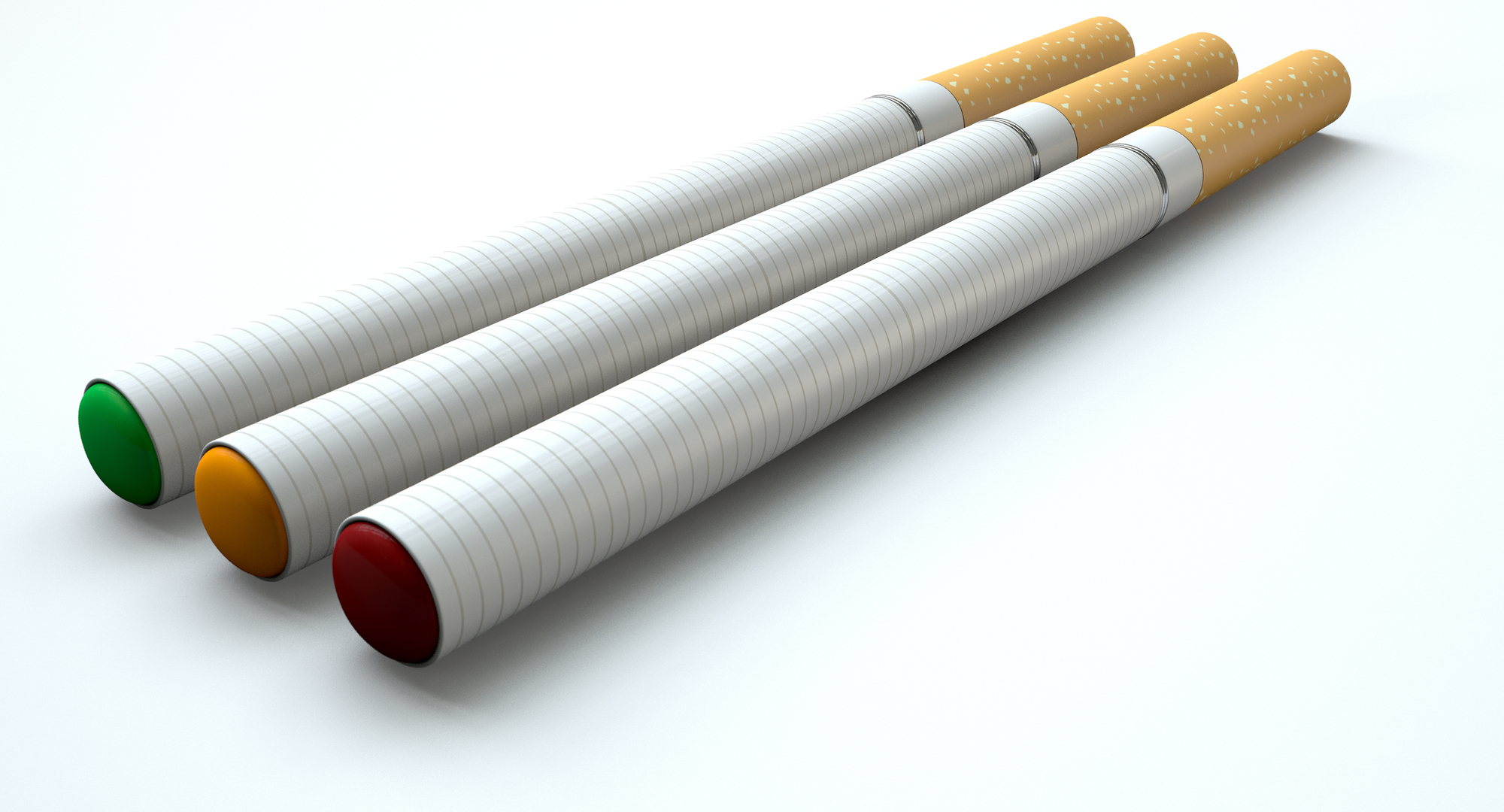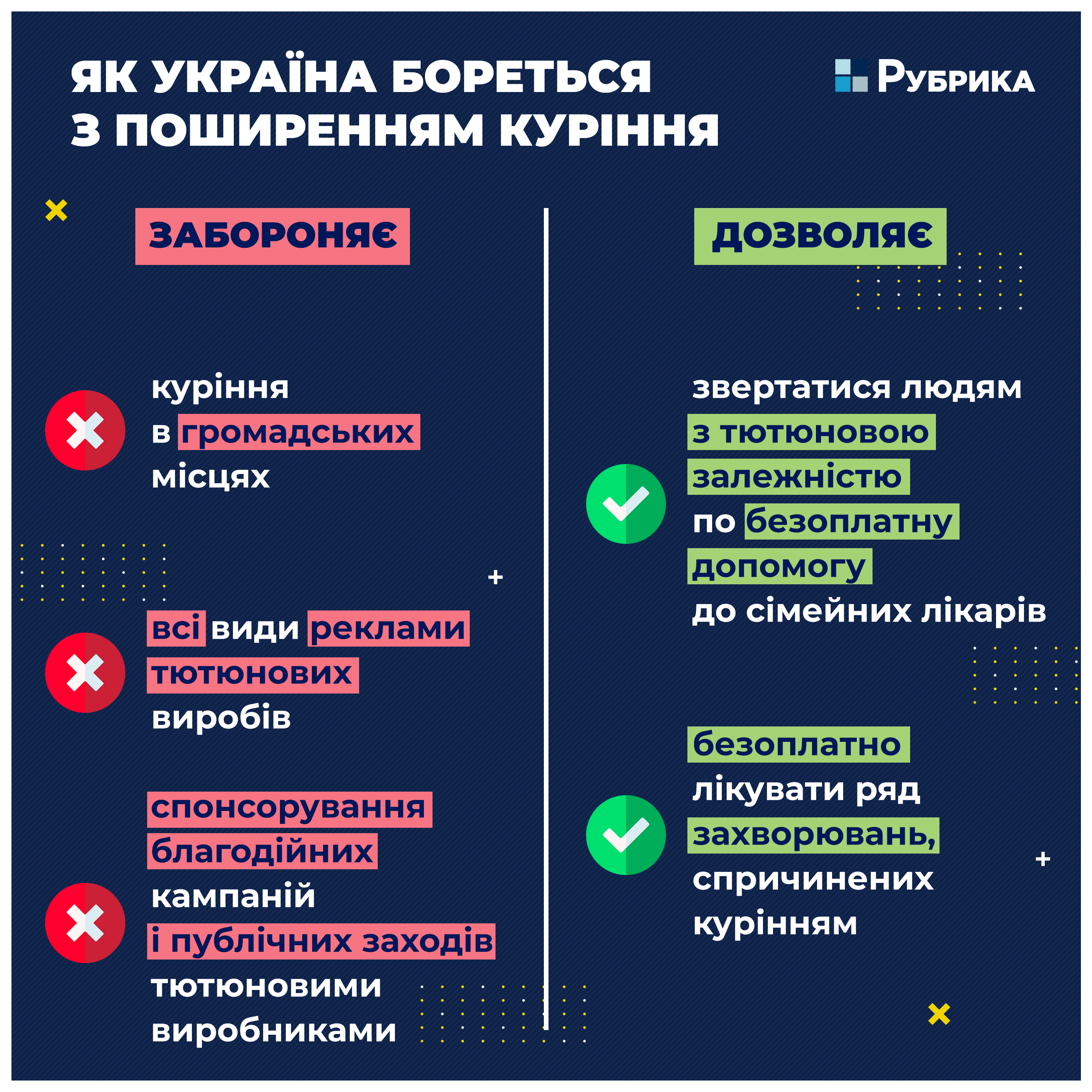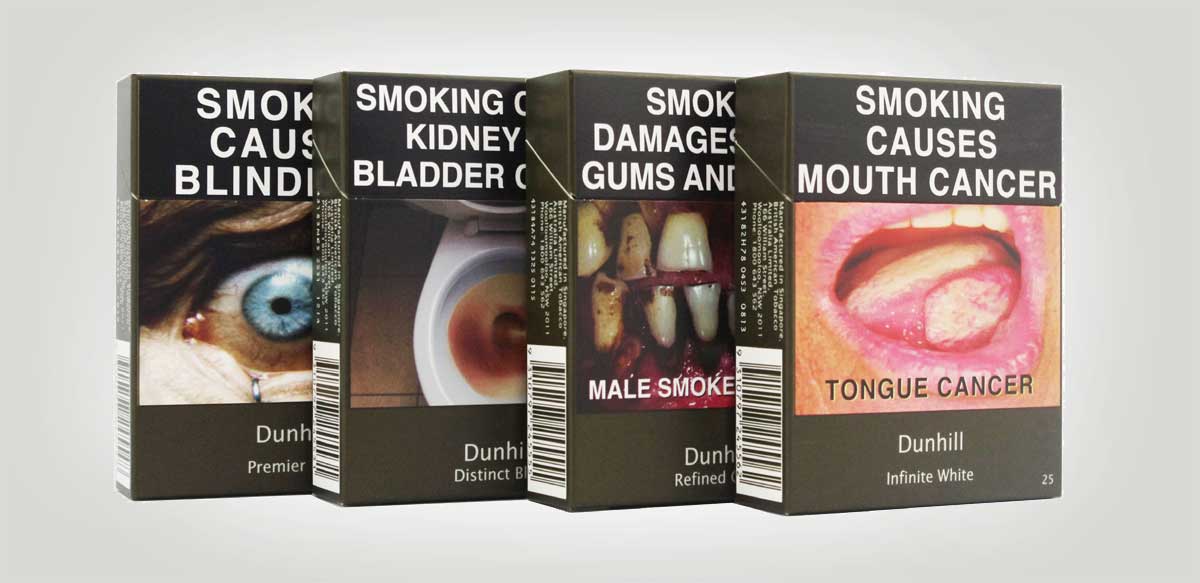
The website of the Ministry of Health. Search bar. "Smoking" query. 11 results. The last publication is dated November 2019. It was timed to coincide with World No Smoking Day and nothing more was written on this tag. As of the end of September 2021, no new data, no supporting information, and no news about smoking.
Ukraine undertook to counter the spread of bad habits in 2006 by ratifying the WHO Framework Convention. At the same time, deputies passed new laws and relevant amendments to existing ones.
But what do they mean now? What does the state do and what is done in it? But can smoking be considered everyone's personal choice? Rubryka was looking for answers.

"And the reason is simple…"
According to the data of the State Statistics Service, in 2020, there were 5.53 million smokers in Ukraine. And the prevalence of smoking among people aged 12 and older was 16.5%. We don't count the residents of the temporarily occupied territories. According to the same study, over the past twelve years, the prevalence of smoking has been declining, but less and less every year.
Aliona is 20. She has already started and quit smoking regular cigarettes, switched to electronic, and deleted both from her life. She doesn't recall immediately when exactly she made the first puff, but still determines the answer:
"I was about 14 years old. Ninth grade. How and why? And the reason is simple. As I would say then, because of problems in the relationship. There was a guy who didn't reciprocate. And there was a company of older boys and girls who I smoked all the time. I was wildly curious!" says Aliona.
The girl laughs when she remembers trying to hide her smoking from her mother. She tells how she first smoked once a week on Saturday or Sunday. Later she started to do it more often. She liked it. But then something went wrong.
"Smoking was pleasant but didn't give a wow effect. The main thing is the process itself when you do it in pairs with someone. But over time I got tired of it. And the body reacted strangely. I began to feel unbearably nauseous after each cigarette. One day I just said 'and why do I need it at all?' and no longer smoked. I played with IQOS for a few weeks and gave that up," Aliona shares.
Heated tobacco products or HTPs, which include IQOS, are tobacco products for electric heating. Their manufacturers register their products as gadgets, thus avoiding the ban on tobacco advertising, which has been in force in Ukraine since 2012.
Billboards, commercials, collaborations with bloggers, and other advertising platforms are fully available for HTPs producers. This product is positioned as a harmless alternative to cigarettes and a fashionable gadget.
But the World Health Organization disclaims all this information: the aerosol for heating contains carcinogens and toxic substances.
The active promotion of HTPs is associated with a slowdown in the decline in the popularity of smoking.
Failure to comply with the law is addictive
January 2020. Briefing. People's Deputy and member of the Verkhovna Rada Committee on Nation Health Lada Bulakh speaks about the need to change the state policy on smoking.
She says that a person, addicted to tobacco, can come to their family doctor and get a free consultation. It's at the expense of the state. So why not immediately counteract the spread of smoking and not just the diseases it provokes?
"Every day in Ukraine, 230 Ukrainians die from diseases caused by tobacco use. And all this is entrusted to the state budget; Ukraine treats citizens for free, but payment for these medical services is done with the budget of the Ministry of Health. We pay taxes from our wallets, and for these taxes, we treat smokers from the diseases they acquire during their tobacco addiction," the deputy explains.
She's not the first and not the only one who talks about it. And at the end of 2020, Bulakh together with thirteen other deputies would register the so-called anti-tobacco draft law №4358 in the Verkhovna Rada. And only in the summer of 2021, it was adopted in the first reading.
But first about the current laws. Hlib Kolesov, a lawyer at the Center for Democracy and the Rule of Law, explains that the last significant changes in tobacco traffic were introduced in 2012.
"Smoking was then banned in public places, including restaurants, bars, public transport stops, etc. Advertising, sales promotion, and sponsorship of tobacco products were also banned. Given that Ukraine ratified the WHO Framework Convention on Tobacco Control (FCTC), these were mandatory requirements…
Since 2012, much has changed, both in the tobacco industry and its range for consumers and in international standards, including the FCTC itself. Unfortunately, Ukraine cannot be called a leading country in the field of implementing the latest effective measures to combat the spread of smoking," the lawyer said.
So, at the official level, the state has removed tobacco from the public field; it's allegedly not advertised, promoted, or smoked in public places. There are laws. And what about their observance?
November 2020. Activists from four Ukrainian cities decide to check whether people don't smoke in public places. Volunteers of the "Youth Free from Smoking" campaign inspect cafes and restaurants in Kyiv, Lutsk, Kherson, and Dnipro, where the law also prohibits smoking. They find out if one can smoke in venues and if so, complain to the State Consumer Service, and then check how it reacts.
Kyiv. 15 complaints and 12 fines.
Lutsk. 10 complaints and 5 fines.
Kherson. 20 complaints and 9 fines.
Dnipro. 37 complaints and 7 fines.


A little later, at the presentation of the monitoring results, the coordinator of the all-Ukrainian campaign, "Youth Free From Smoking," Oleh Slabospytskyi will tell: the main problem was the advertising and use of HTPs in institutions, which are still not regulated by law.
And the lawyer Hlib Kolesov explains how the controlling authorities work:
"The only service in Ukraine that can influence legal entities in this matter is the State Food and Consumer Service, but it uses its powers incompletely, and in terms of smoking e-cigarettes and HTPs, there's no possibility to act at all, as relevant changes haven't been made yet.
Another body that has an impact on violating individuals is the National Police of Ukraine. Unfortunately, due to the workload and low public danger of smoking (in terms of legal consequences, of course), law enforcement agencies are reluctant to respond to calls for violations of smoking legislation.
Therefore, it's very difficult to reach the police in case of detection of sale of excise-free tobacco products on the streets of Ukrainian cities and smoking in public places, often limited to individual decisions to prosecute for smoking in unauthorized places and only when a police officer simply doesn't know where to get the so-called 'indicator.'"

"Doctors did their job a long time ago"
The effect of electrically heated tobacco products on human health is being studied. They have appeared on the market relatively recently, so long-term observations are still lacking. But scientists are already drawing conclusions about the similarities between the effects of HTPs and regular cigarettes. And those have long been studied.
"I'm a doctor and I operate on people who smoke all my life," says oncology surgeon Andrii Hanul, adding that he smokes himself, so it's not moral to say that it's wrong, but he can easily explain things that are obvious to doctors.
Andrii Hanul headed the thoracic department of the Kyiv City Clinical Oncology Center, worked at the Platon Shupyk National University of Health of Ukraine, and is now a leading researcher at the National Cancer Institute. The doctor believes that everything has already been said about the dangers of smoking, so there will be no changes until the state takes action.
"Doctors did their job a long time ago; they've proved that cigarettes aren't useful. Lung cancer began to spread in the late 40s. Before that there was such a disease, they knew it, but didn't pay attention to it because it was rare. Although people smoked the same as now. What's it partly related to? The fact that the development of nuclear energy began in the 40s. And many radioactive elements began to enter nature. And tobacco accumulates polonium. So in part, the development of lung cancer is associated with the content of polonium in tobacco. But it's just one of the hypotheses that can be argued," says the surgeon.
Then the doctor suggests finding photos of cigarette packs on the Internet, for instance, from Singapore. He comments that there are really scary photos on the packaging, collected from various cancer centers, and that's what cigarettes, in his opinion, should look like so that warnings like "smoking kills" look convincing.
"Now lung cancer is hardly growing. It has stabilized. But this disease is very difficult. Today, people are treated well, but data on the cure of lung cancer have reached only 20% in five years. You can compare when 99% of people living with prostate cancer, and 93% with breast cancer, and about 66% with colorectal cancer, which has already exceeded lung cancer. And only 20% live with lung cancer," Andrii Hanul sums up.
The doctor also notes that smoking isn't the only factor that affects the development of cancer. Similarly, cancer is not the only disease caused by smoking.
Another Andrii, a patient, not a doctor, shares his story. The guy is in the process of long-term treatment, which forces him to give up bad habits.
"I never had problems with addictions. I often started and quit smoking. But it turned out that in August I started smoking a lot and drinking alcohol. It was just nice. However, I overdid it and after a while, I was hospitalized with acute pancreatitis (inflammation of the pancreas). Now I'm on a diet and a taboo on alcohol and tobacco. I haven't smoked for a month and, to be honest, I miss it. I liked it. It made me feel relaxed," says Andrii.


The line is temporarily down
It's written near the hotline number on the website, "I Stop Smoking." The resource was created in 2017 and included the already mentioned hotline, a chat with a specialist, the opportunity to take a test for readiness to quit smoking, and publications with information about smoking and ways to quit smoking.
The resource was launched by the NGO "Life" in cooperation with the Ministry of Health, the WHO Office in Ukraine, and the Swiss Agency for Development and Cooperation.
In 2019, the hotline ceased to function. Activists didn't have enough funds to maintain it, and the Ministry of Health refused to help with the line for the same reason.
"In Ukraine, 20% of the population is still addicted to tobacco products. And there is a need to help these people. That is, the idea was to create a hotline so that a person addicted to tobacco can call and get free advice on quitting smoking from a specialist based on proven tactics," says the manager of advocacy of the NGO "Life" Dmytro Kupyra.
The expert shares statistics: in 2017 and 2019, the service received 9,000 calls to the hotline, 45,000 people visited the website and more than 150 smokers received advice. As Dmytro Kupyra explains, the number of those who applied and those who received a consultation differs, because smokers applied to the hotline several times. Many calls came from close tobacco addicts.
"Protocols and standards for telephone assistance were fully set up, we selected specialists who did it. The work schedule has already been set up. We taught people how to follow these protocols. But we're NGOs, we don't have our resources. Helping to quit smoking is a great task for the state and the Ministry of Health. Unfortunately, the Ministry of Health didn't find the resources to maintain the service, although it didn't require large funds as for the country's scale. Our resources also ran out and we didn't have the opportunity to pay for consultants," said the "Life."
In the meantime, you can still find useful information on the site, although without the ability to get targeted help from consultants.

"Safer" or "less harmful"
Today, the state policy to combat the spread of smoking is quite limited. Although we have the Law "On Measures to Prevent and Reduce the Use of Tobacco Products," over time, its effectiveness has decreased. Lawyer Hlib Kolesov also speaks about it.
The expert believes that the anti-tobacco draft law №4358 will change the situation. It aims to reduce the attractiveness and availability of tobacco products. This will not bypass the latest tobacco products, electronic devices for smoking (electronic cigarettes, as well as devices for consuming tobacco without heating it).
"This will help prevent nicotine addiction among people, especially children and young people, among whom electronic smoking devices are now extremely popular, which are falsely and insidiously advertised by the tobacco industry through KOLs, influencers, media personalities as being 'safer' or 'less harmful.' This manipulation is denied by the WHO, but the big money of the tobacco industry spent on marketing does its job," the lawyer comments.
What exactly will change in the fight against smoking if the law is passed? These are the following innovations:
- changes to consumer health warnings and, accordingly, the display of such warnings on tobacco packs, e-cigarette packaging, refill containers and liquids used in e-cigarettes, packaging of herbal smoking products, and smokeless tobacco products (medical warnings on cigarette packs) will have a picture on both sides and will increase by up to 65% of the total size of the package);
- ban on advertising activities and sponsorship of electronic smoking devices (devices for consuming tobacco products without their combustion, electronic cigarettes, refill containers, and liquids used in electronic cigarettes);
- a significant increase in liability for violations of legislation on measures to prevent and reduce the use of tobacco products and their harmful effects on public health;
- ban on smoking heated tobacco devices in all places, as is already the case with cigarettes and electronic cigarettes (including schools, hospitals, restaurants, workplaces);
- a ban on the sale of cigarettes and tobacco for roll-ups with different flavors (for example, fruit, berries, or sweets), as it currently acts as a "hook" or a bait to attract children to smoking;
- ban on the sale of tobacco products for electric heating (HTPs) to minors.
"The draft law also bans the sale of cigarettes and tobacco for roll-ups with flavoring additives. As practice shows, tobacco products with the taste of fruit or sweets are the most attractive to young people. Therefore, we at the Center for Democracy and the Rule of Law together with partners from NGOs 'Life' continue to insist that such a ban should be extended not only to cigarettes and tobacco for roll-ups but also to all tobacco products and liquids used in e-cigarettes," says Hlib Kolesov.
Several European countries already use this model and are more closely monitoring the ban on smoking in public places. Also, the methods of combating smoking include the increase in prices for tobacco products and a complete ban on advertising such products. Meanwhile, some countries are finding their solutions to the fight against tobacco.
Turkey. Prohibiting demonstration of any tobacco products on television. If, for instance, movies have smoking scenes, the cigarettes on the screen are blurred.
Iceland. Prohibiting public display of cigarettes in shop windows. Tobacco products can be displayed in stores only at the request of adult buyers. The same rule exists in several countries, but Iceland was the first to practice it.
Some US states. Prohibiting smoking in buildings of any property, including two or more apartments.
Italy. No smoking in the presence of pregnant women and children. The penalty for violation can reach 500 euros.
Time will tell when the Ukrainian government is ready for radical changes in the issue of smoking.
Newsletter
Digest of the most interesting news: just about the main thing













